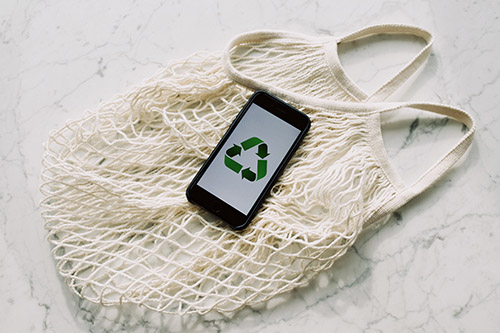Reshma Hannah and Sahar Mansoor
Growing up, I was always an environmental enthusiast and loved spending time with my dad and sisters in Bangalore’s lungs – Cubbon Park. Watching the birds chirp, the trees blowing against the wind, the clouds floating through the sky, always provided me with a sense of calm and joy through several situations. As the years passed, I felt overwhelmed by India’s trash problem. I was confronted by it every day – seeing piles of garbage on the streets – and I spent time with local waste pickers and watched them sort through waste with their bare hands. I started to think of the environmental, health and social justice issues associated with our garbage problem.
I wanted to stop being part of the problem. I knew I had to address my own trash problem first. My solution was to live a lifestyle that best reflects the values I cared about. I had called myself an environmentalist for about six years at the time. I decided I needed to live a life fully congruent to my environmental and social justice values. I needed to walk the talk and I knew I had to start living a zero-waste lifestyle. Having lived through 5+ years of being a zero waster, I had the chance to be able to learn the importance of staying mindful of our carbon footprint. With that said, here are a few practices I’ve been incorporating into my lifestyle to actively take steps to reduce the same.
1. Be mindful about what goes into your products

I see the shift towards conscious choices happening via mindfulness. Gen Z is becoming more mindful and asking manufacturers the right questions, like, ‘What is in my products?’ When we make conscious efforts to shift towards ethically made products that contain ingredients that benefit us and the environment, our carbon footprint is automatically minimised. Look at the ingredients in your favourite products and check up on them to see the kind of impact they may have on your body and the environment. And don’t hesitate to write to your favourite brands asking them about their manufacturing processes and the ingredients as well. As consumers, we have the right to know!
2. Incorporating greens into your meals
While we all have preferences with our dietary choices, we can try and make conscious choices to switch to plant-based options in our meals. What with our dal curries, our rajma chawal, a plethora of sabzis and more, you will be a plant-based champ in no time. In case you’re looking for some vegan food recommendations, check out this reel for more.
3. Compost your food waste

Did you know that upto 60% of our food waste can be reduced by just composting?! Additionally, a study also found that this simple practice can reduce more than 50% of carbon dioxide-equivalent greenhouse gas emissions on a larger scale! And that is the beauty of these simple practices. They are not only great solutions for our daily lives but also very effective at tackling serious issues like climate change. If you are interested, you can learn more about composting and other such zero waste practices in our online course ‘Zero Waste 101’
4. Opting for electric mobility
The electric vehicle (EV) has been gaining a lot of traction over the past few years, and rightly so! Owning an EV is not just an environmental investment. Certainly, ground pollution is improved with the lack of tailpipe emissions, but also, depending on your energy source, you may be emitting little to nothing from utility to outlet. This is great, since EVs have something to offer to everyone:
● Lower maintenance costs associated with fewer moving parts (including no oil changes).
● The ease of charging at home, as well as lower fueling costs with electricity versus gasoline.
● No legacy contamination is involved with fossil fuel production and petrol pumps, although it is acknowledged that no vehicle comes without some resource extraction.
5. Eliminating single-use plastic

I understand that eliminating plastic altogether can be a challenge, especially since we live in a society that has incorporated the material across all sectors and industries. Moving away from single-use plastic by swapping it with reusables – reusable cutlery, bamboo toothbrushes, cloth bags for groceries and more. Estimations of the carbon footprint of plastic indicate that the life cycle of single-use plastics accounted for about 1.5 per cent of global greenhouse gas emissions in 2019.
With simple, practical solutions like these, you will find yourself tackling the climate crisis in more ways than one while leading a low-carbon lifestyle. These practices will also act as a catalyst to kickstart conversations on climate action and environmental awareness with the people around you – we all need that little push to get started on our journeys sometimes!
About the Authors
Sahar Mansoor is the founder and CEO of Bare Necessities, a zero- waste social enterprise. She is a circular-economy nerd, a voracious learner and a curious traveller. Sahar is co-author of ‘Bare Necessities – How to lead a zero-waste life’ Published by Penguin Random House. Sahar has obtained accredited degrees on environmental topics in India, the USA and England, becoming a University of Cambridge alumni. Her business offers zero-waste personal care, lifestyle, home care and educational products and services, including online sustainability courses. She has also volunteered in Guatemala, Jamaica and the Democratic Republic of Congo for humanitarian projects. Sahar has a 500-gram jar of waste that she brings to the sustainability workshops she conducts, which is all the waste she has produced in the last five years. For more, visit https:// barenecessities.in/.
Reshma Hannah is the Content and Marketing Associate at Bare Necessities. Through content ideation and creation, she guides people through their zero-waste journey and researches innovative strategies to educate people about the zero-waste lifestyle.












